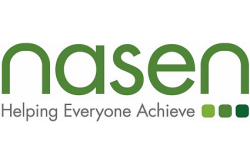Governor wins SEND teacher of the year

Meet the young school governor who’s just won SEND Teacher of the Year
Jemini Patel says becoming a governor at a different school helped her to win the award from NASEN, the National Association of Special Educational Needs.
We caught up with the assistant head to find out about the impact of her work and how her knowledge of governance has helped.
Jemini, how long have you been a teacher?
I’ve been a teacher for seven years and I started in my newest role, Head of Inclusion, earlier this year. Our school, Whitefriars, is a 3-19 years all-through school in Harrow, but I’m also a governor at Stanburn, local maintained primary school.
When did you find out about the award?
I was nominated earlier this year and found out I’d been shortlisted in October. Three of the nominees were invited to the award celebration and that’s when I found out I’d won. The award is from NASEN which is the National Association for Special Educational Needs.

Can you tell me a bit more about why you were nominated?
I work in a mainstream school and we have lots of pupils with a wide range of complex and profound learning difficulties. These include severe autism and global developmental delay and many are non-verbal. A lot of these children are currently on waiting lists to attend special schools. I felt I wasn't doing enough or didn't have the knowledge or training to support these children so I started taking training courses, using my own funding, to help my school and so we could improve the educational experiences for these pupils. To support these children getting into special schools, I completed many EHCP applications to ensure they got the best support possible for now and their future.
I developed a new learning space, adopted a new communications system and put in place wider provision for these children and it’s had a really big impact. I also supported teachers so they could improve their provision in class. I created bespoke learning for each pupil. We did everything we could to make the mainstream setting work well for these children. In particular, I supported our early career teachers (ECT). They’re fresh out of university and it’s a challenge to have children who don’t communicate in class and to work out how to adapt and assess the learning for them.
Lots of our parents are happy with the provision we offer now and our systems are much better. Children with significant needs are now better supported.
What motivated you to do this?
I felt that I wasn’t doing enough for these children and I wanted to do more to support them. I did my SENCO qualification and the more I learned, the more I could apply it to my daily practice and the more motivated I was to keep learning and to find out about other best practice out there.
When did you become a governor?
I became a governor 4 years ago through my local authority. I actually got in touch with The Key to find out how to become a governor and was pointed in the direction of my local authority. I’m a local authority governor with responsibility for special educational needs and English.
You've said that part of the reason you got this award is the knowledge you gained from being a governor. What have you learnt that was so helpful?
It’s so useful to learn about the wider vision of a school - to learn about the importance of safeguarding from a strategic point of view, about the purpose of the curriculum. Also understanding policies at a strategic level, especially as it’s us teaching staff who put those policies and that vision into practice.
It’s also incredibly useful in terms of career progression. As a governor you often sit on recruitment panels so you can see how other people present themselves at interviews - that’s not something you’d know otherwise. I’ve chaired the headteacher appraisal panel for the past three years, which is a tremendous insight into leadership.
It’s good for me as a teacher to see the kind of questions governors ask about the curriculum. It’s also useful to see the school's self evaluation or improvement plan, which you don’t often see as a class teacher but again you’re linking in to that wider view of the school’s vision.
I tell my fellow teachers to become governors as I’ve learnt so much and it’s had a real impact on my day-to-day practice.
What would you say to teachers who worry they don’t have time to take on a governance role in another school on top of a busy day job?
Teachers need to know that they are allowed reasonable time off for governance duties. As for meetings, most of those are online and they’re very focused. We go into schools for learning walks and visits which are so valuable. I think the workload is do-able if you consider it useful professional development.
Interested in becoming a governor or trustee?
If you're a teacher or staff member working in a school and would like to become a governor, we recommend reaching out to your local authority as Jemini did, or speaking to a governor recruitment charity such as Governors for Schools.
Learn more about the opportunity with the National Governance Association's Educators on Board campaign.


 NASEN is the
NASEN is the